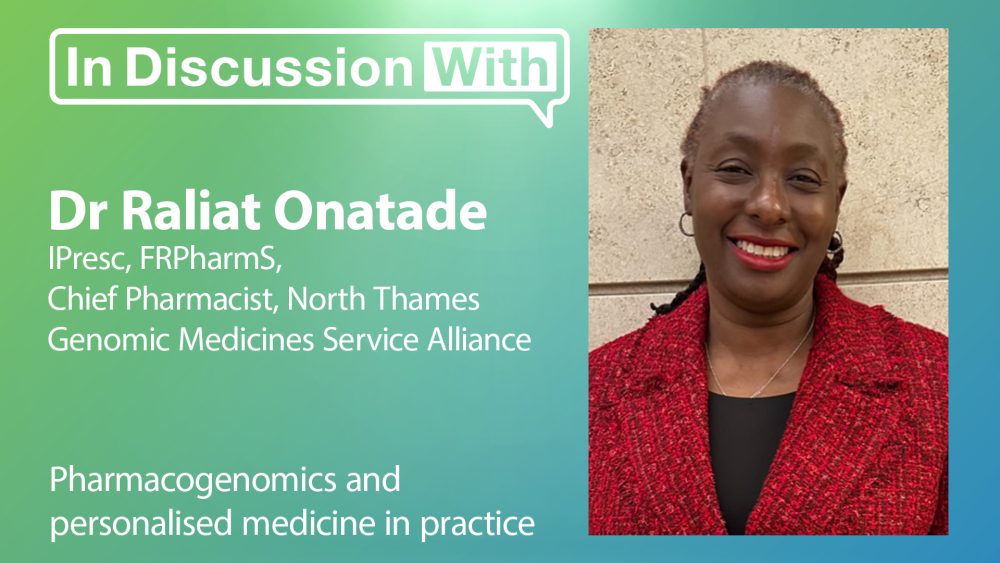Advertisment
Pharmacogenomics and personalised medicine in practice

Pharmacogenomics and personalised medicine are increasingly becoming a part of mainstream healthcare and it is an area where pharmacists have a major part to play. In this series of short videos, Raliat Onatade, Chief Pharmacist for North Thames Genomic Medicines Service Alliance, describes what has already been done and the opportunities and challenges for further development.
The added value of pharmacogenomics to prescribing
Pharmacogenetic information allows clinicians to identify people who handle drugs differently and may therefore be at risk of over- or underdosing of certain medicines. This means that prescribers can ‘get it right first time’ – reducing the risk of waste as well as reducing the risk of exposing the patient to harm due to over- or under-dosing.
One example of the way on which pharmacogenetic information can guide prescribing is the identification of DPD deficiency resulting from a mutation in the DPYD gene (which codes for the enzyme dihydropyrimidine dehydrogenase (DPD). DPD is involved in the metabolism of fluoropyrimidine drugs – e.g. 5-fluorouracil and capecitabine. DPD deficiency is associated with increased toxicity from such drugs. Pre-treatment testing and dose adjustment is now the standard of care.
How does pharmacogenomics work in day-to-day practice?
A number of examples illustrate the way that pharmacogenetic testing can be used to improve the safe and effective use of drugs.
A mitochondrial mutation – m.1555A>G – is linked to increased susceptibility to deafness if treated with aminoglycosides. “When that’s associated with a maternal history of deafness then the risk goes up even further”, says Dr Onatade. Pre-treatment testing is advised and there is even a point-of-care test available for neonates.
Genetic variation can lead to reduced activity of the enzymes TPMT (thiopurine methyltransferase) and NUDT15 (nudix-type motif 15) and increased toxicity of purine analogues e.g. 6-mercaptopurine and 6-thioguanine.
Pharmacogenetic testing in relation to psychotropic drugs is less well-developed. Currently there is much research in this area; one important question is whether routine testing and the identification of fast- and slow-metabolisers will actually make a difference to outcomes.
The challenges of developing pharmacogenomic services
The PREPARE study demonstrated that there was a significantly reduced likelihood of developing adverse reactions if people were tested for 12 specific genes in advance of treatment. “There seems to be a really good case for introducing some routine pharmacogenetic testing for these commonly-used drugs into normal treatment”, says Dr Onatade.
Now the NHS needs to build the infrastructure to support the implementation of pharmacogenomic services. “Whenever I speak to other clinicians, other …. healthcare professionals, they’re really clear that leadership for pharmacogenomics must come from pharmacy”, says Dr Onatade.
Two key challenges now are, first, education and training for pharmacists to ensure that they are familiar with the topic and able to advise health care professionals and patients appropriately and, second, informatics structure and processes to ensure that the genetic information is available when required but is securely protected.
About Raliat Onatade
Raliat Onatade holds three positions:
- Chief Pharmacist for Northeast London Integrated Care System
- Group Chief Pharmacist for Bart’s Health NHS trust also in East London
- Chief Pharmacist for North Thames Genomic Medicines Service Alliance
Dr Onatade’s EAHP keynote presentation, Personalised medicine – opportunities for hospital pharmacists in clinical practice can be viewed at: https://events.eahp.eu/cmGateway/vimeoplayer.html?vimeoId=810496208
Read and watch the full series on our website or on YouTube.
This episode of ‘In Discussion With’ is also on Spotify. Listen to the full podcast now.





